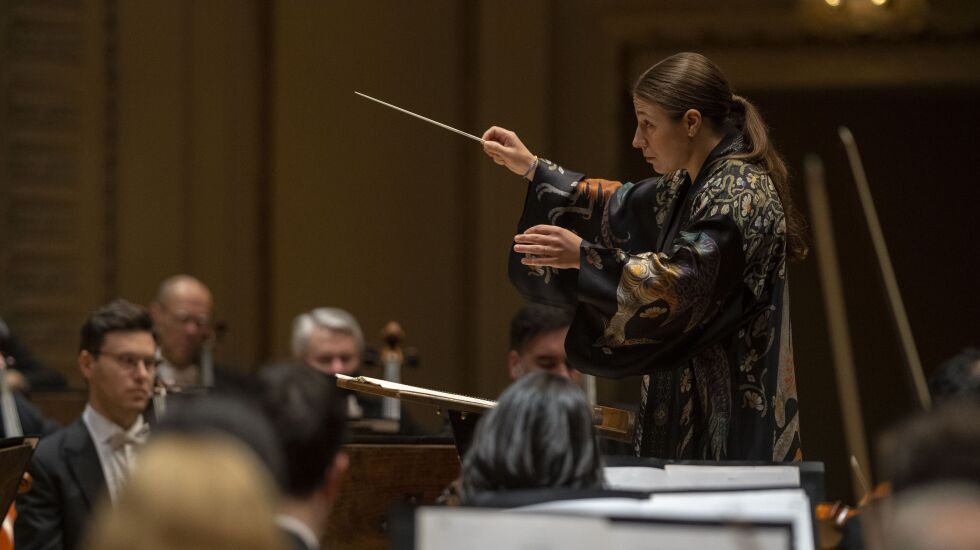
Musicians bridge the chasm between our world of woe and the higher sphere of the sublime. Just look at Dalia Stasevska. Six weeks ago she was driving a van filled with supplies into war-torn Ukraine, her homeland. Last weekend, she made her debut with the Chicago Symphony Orchestra, conducting a trio of concerts.
“It was fantastic,” she said. “This is a legendary orchestra. I grew up listening to their recordings.”
Born in Kyiv, she grew up in Finland and trained as a violinist. She has conducted around the world, but this is her first visit to Chicago; she was grateful for the blue and yellow flags on display.
”American support has meant so much for Ukraine,” she said. “I can’t underline it enough. The first day I walked in this city and saw Ukrainian flags. It meant so much.”
When the Russians invaded earlier this year, Stasevska wasn’t sure she should continue wielding a baton.
“The war has changed my life quite a lot,” she said. “When the war broke out in February ... I was just on my way to conduct the Seattle orchestra. I seriously thought of canceling all my concerts. The Seattle Symphony Orchestra was really kind to me. They called me and asked, ‘What can we do to help Ukraine?’ It made me think: I cannot change the world and stop this war with music. But I can use my mouth and speak out and use this platform as my own front line.”
She has family in Ukraine and has been back twice since the war started, delivering medicine and supplies.
”It’s really heartbreaking to go there and see the country so crippled,” she said. “Indescribably heartbreaking. The city in sandbags. Bombed all the time. Inflation is terrible. People don’t have money. It’s difficult to describe the reality.”
On her latest trip, once supplies were distributed, she knew what she had to do.
“We pulled together a concert, playing only Ukrainian classical music,” she said. “To have a moment of normality in a place where nothing is normal. To have that moment where we don’t have to think about horrors, just remember what it is like to go to a concert, to share together with musicians and be happy.”
Her CSO program began with “Paradisfåglar II” by Swedish composer Andrea Tarrodi, 41.
”Her music is really dear to me, and I wanted to bring Chicago a small souvenir from the Nordic countries,” she said. “It’s something really important, to champion new composers.”
Not to mention female composers, a rarity in classical music. Even more scarce are female conductors. Of the 25 top orchestras in the United States, none have a woman as music director. I asked Stasevska about the obstacles she faces in a profession dominated by men.
“I’m a musician and I love music to bits,” she began. “I enjoy so much my profession that has been always my focus, whatever stones there have ever been in my path .... That is really the important thing.”
Besides, things are changing.
“‘Me Too’ was one of the most important revolutions for women worldwide,” she said. “Also for our industry, because orchestras suddenly looked in the mirror and said, ‘Wait a minute, we don’t have enough female representation in composers and conductors.’ It made a huge difference. Black Lives Matter expanded it even more. The direction our classical music is going is so good and so right. The doors are opening and the industry is straining to see potential, to see people they haven’t seen before and invest in people they haven’t thought of before.”
The second piece in her CSO program was “Violin Concerto in D Major, Op. 35,” the Tchaikovsky masterwork once dismissed as “unplayable.” CSO artist-in-residence Hilary Hahn played it superbly Saturday night, when I attended. Last on the program was Bela Bartok’s “Concerto for Orchestra,” also appropriate for our political moment, as Bartok came to this country in 1940, fleeing Hungary during an earlier outbreak of bloody European territory-grabbing madness.
Stasevka spoke of how music can restore, unify and inspire.
“To make music made sense,” she said. “We have to deal with such horrible news daily. Music is such a great catalyst. It’s like a safe space to go through these emotions. Music brings us together in this fight, for democracy, for Ukraine. It gives us so much hope there is so much good and something to fight for.”







